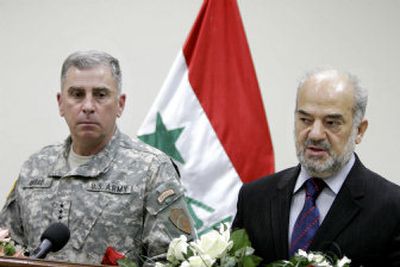U.S. general praises Iraqi troops’ efforts

BAGHDAD, Iraq – Iraq’s president said Saturday that he had been assured that U.S. troops will stay in his country as long as needed, while at least 14 people were killed in explosions and gunfire nationwide as vehicle restrictions were lifted in Baghdad.
A top U.S. general, meanwhile, said he was “very, very pleased” with the response of Iraqi armed forces in containing recent sectarian bloodshed, disputing critics who said too little was done to quell attacks that killed more than 500 people the past week.
Gen. John Abizaid, chief of U.S. Central Command, spent two days in Baghdad meeting with top Iraqi leaders after the Feb. 22 bombing of a golden-domed Shiite shrine in Samarra triggered reprisal attacks against Sunnis that pushed the country to the brink of civil war.
Iraqi security forces blunted the sectarian killing with an extraordinary daytime curfew in four flashpoint provinces last weekend, followed by a driving ban in Baghdad on Friday.
But with the ban lifted on Saturday, violence resumed, with a bomb exploding at a bus terminal in southeastern Baghdad, killing seven people and wounding 25.
In other violence Saturday:
“A bomb killed two Interior Ministry commandos patrolling in the Salman Pak area southeast of Baghdad and wounded two others.
“A bomb in a busy commercial area in Baqouba killed a young girl and injured eight.
Early today, Interior Ministry commandos stormed a Sunni mosque in west Baghdad, killing three people – including the mosque imam and his son – in a 25 minute gunbattle. The cause of the clash was not known.
Abizaid said he was “very, very pleased with the reaction of the Iraqi armed forces during the aftermath of the bombing in Samarra.”
He warned that more such attacks were likely but added: “We believe that the Iraqi armed forces, in conjunction with the multinational force, can deal with any security problem that may arise.”
The surge of sectarian killing has complicated already tangled negotiations to form a broad-based government after the Dec. 15 parliamentary election, which U.S. officials consider essential to stabilize the country so their troops can start pulling out this summer.
President Jalal Talabani said Abizaid assured him U.S. forces “are ready to stay as long as we ask them, no matter what the period is.”
Talabani, a Kurd, is at the center of a campaign by Sunni, Kurdish and some secular politicians to deny the Shiite Prime Minister Ibrahim al-Jaafari a second term. The three blocs have asked the dominant Shiite United Iraqi Alliance to nominate another candidate.